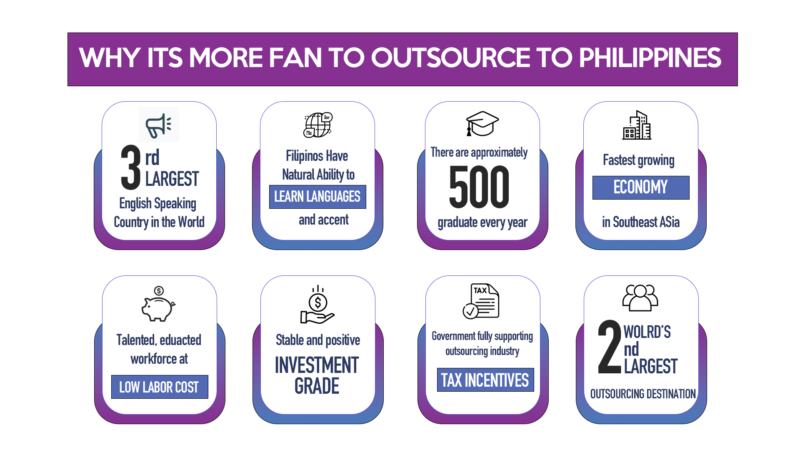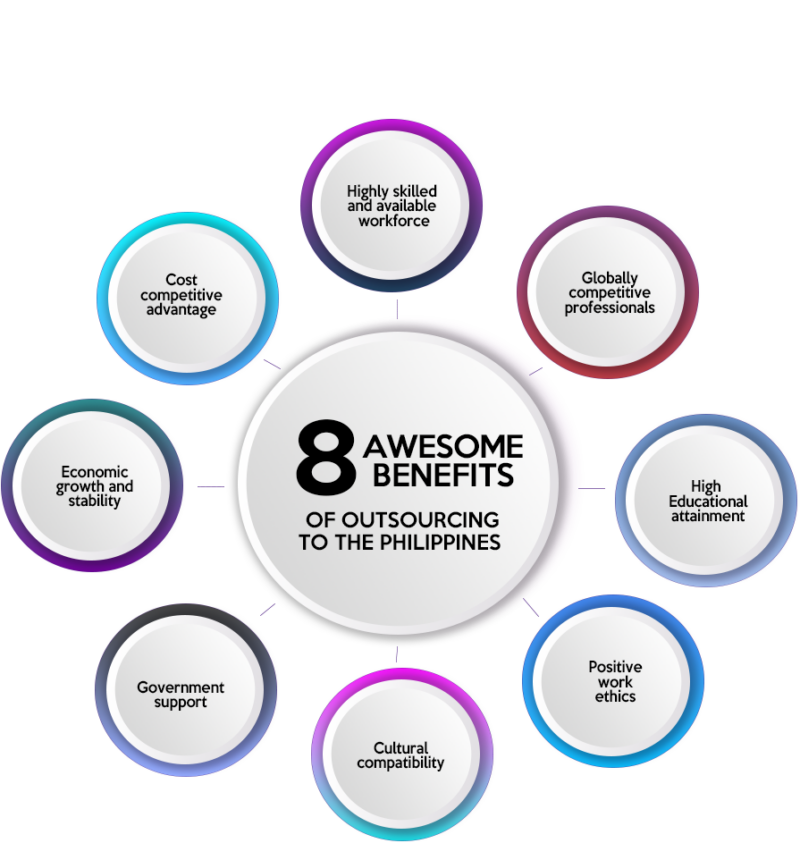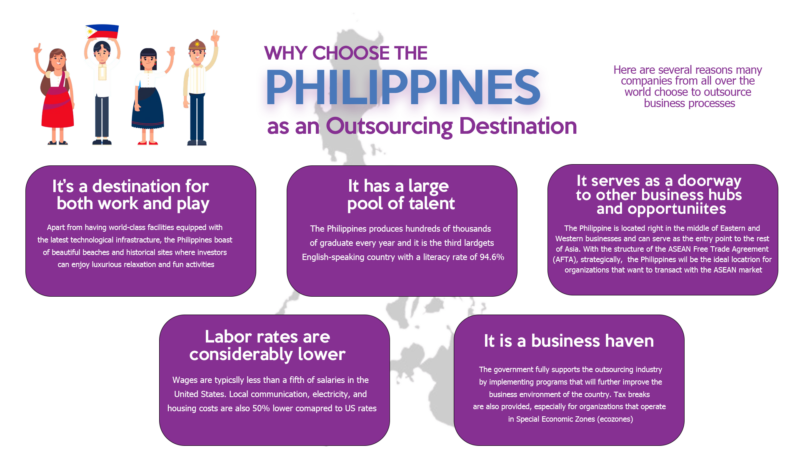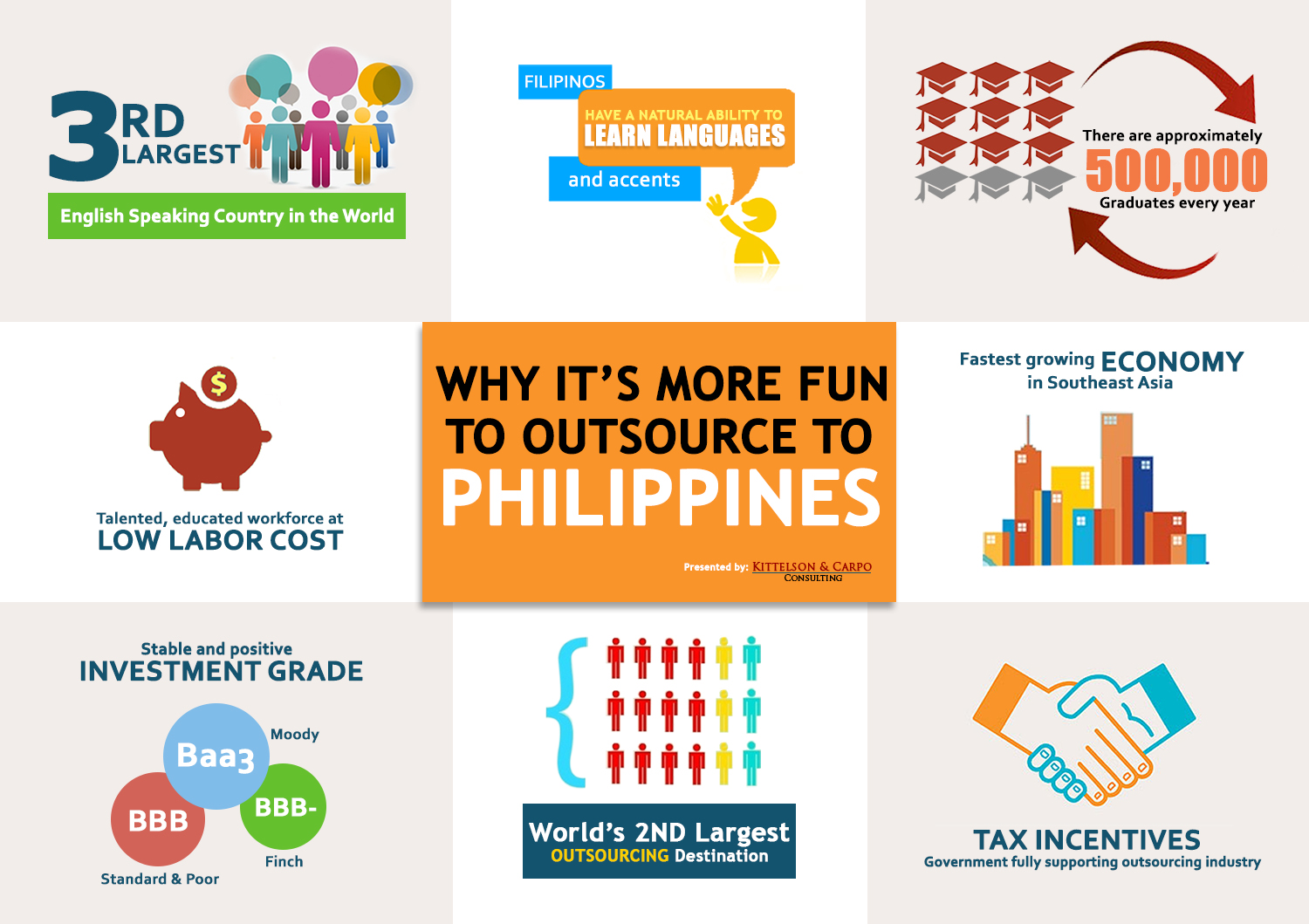In today’s fast-paced business environment, outsourcing has grown in popularity for businesses searching for radical ways to stay competitive, cut costs, and boost their bottom line. With its highly skilled and educated workforce, affordable solutions, and welcoming business environment, the Philippines has established itself as a top choice for BPO. Choosing to outsource in the Philippines is not just a cost-saving measure but also a smart move that can keep you ahead of the competition.

In this article, we’ll look at the pricing model of outsourcing call centers, content creation, graphic design, IT support, and cybersecurity services to the Philippines. We’ll also discuss the reasons why should you outsource to the Philippines, the factors that affect all the costs, compare outsourcing to the Philippines and building an in-house team, and the factors to consider in choosing a firm to outsource your ecommerce business requirements.
Why Should You Outsource to the Philippines?
Time and Cost savings
Businesses can save time and money by outsourcing to the Philippines. The cost of hiring an internal team in a Western country is frequently much higher than the rates offered by BPO providers in the Philippines. Thus, businesses can lower overhead costs, such as office rent, utilities, and other expenses related to maintaining an in-house team. Additionally, BPO providers in the Philippines can provide round-the-clock assistance, speeding up response times and boosting client satisfaction.
Reduced Errors
Businesses can improve their operations by outsourcing to the Philippines as the Philippines has a highly educated, skilled, and meticulous workforce, which can help lower errors when performing tasks like data entry, content creation, and quality assurance. Thus aiding businesses in increasing operational effectiveness and reducing the possibility of costly mistakes.
Access to Expertise
Filipino workers are competitive and high-caliber professionals fluent in speaking and writing in English. With expertise in IT Support, Graphic Design, Call Center, Content Creation, and Cybersecurity, the Philippines is home to several BPO companies. Businesses can use this knowledge, the newest technologies, and industry best practices by outsourcing to the Philippines.
What Impacts the Cost of Outsourcing to the Philippines?
Size of the Company
Larger companies might need more involved and more complex services, which could raise the overall cost of outsourcing. As they may have IT systems that are more complicated, more enormous databases, and a more comprehensive range of goods and services to offer, BPO providers need to devote more resources and personnel to meet these more prominent companies’ demands.
On the other hand, they can also benefit from economies of scale because BPO companies charge less for more significant contracts. For larger companies that can commit to long-term outsourcing arrangements, BPO providers may be willing to offer bulk discounts or negotiate more favorable contract terms.
Level of service needed
The required level of service may also impact the costs of outsourcing. Higher rates may be necessary for more complex and specialized services because they might need more resources and expertise. For instance, outsourcing cybersecurity services to the Philippines may require more cutting-edge technologies and technical knowledge to meet the demands of a complex IT infrastructure.
Similarly, services that need round-the-clock assistance or quick turnaround times might be more expensive than those that don’t, as offering 24/7 support or short turnaround times may necessitate hiring additional staff or having them work outside of typical business hours, which could raise the overall cost of outsourcing. Philippine call centers usually have night-shift employees who are paid on a monthly basis. Under Philippine law, an employee who works on night-shift should be paid night differential rates which can also raise up the overall expenses.
Location
Due to varying labor costs and other expenses in various cities and regions, location can also affect outsourcing costs. For instance, outsourcing to major cities like Manila might cost more than outsourcing to less populated areas since living and labor costs are frequently higher in metropolitan areas.
However, compared to other countries such as the United States, Western Europe, Eastern Europe, and Latin America outsourcing in the Philippines has a low cost as the exchange rates of the US Dollar and European Pounds have a higher value when converted into Philippine pesos.
Customization
Developing customized services might take more time and money, which could raise the overall cost of outsourcing. Tailoring services to the client’s unique requirements may necessitate additional planning, testing, and consultations.
Customized services, however, might also bring the company more value and advantages, like better system and process integration. Businesses can take advantage of the knowledge and experience of outsourcing providers, who can assist them in designing and implementing tailored solutions that meet their particular needs by outsourcing customized services to the Philippines.
Average Costs to Outsource to the Philippines
Depending on what service your company seeks determines the cost of outsourcing. Here is the standard pricing model for seeking the services of business process outsourcing companies in the Philippines.
Here is the average salary of BPO professionals annually in the Philippines:
- IT support: $5,474
- Graphic design: $6,401
- Call center: $5,174
- Content creation: $6,730
- Cybersecurity: $11,231
However, aside from the labor costs, outsourcing companies charge for operating expenses, and service fees that can cost you $500-$1500/month per employee. The outsourcing workforce cost will increase depending on the number of professionals you need for your business operations.
Outsourcing to the Philippines vs. Building an In-House Team

Initial Setup Costs
Outsourcing Services
As businesses can leverage the expertise and infrastructure of outsourcing providers, outsourcing in the Philippines is a cost-effective alternative. Thus, initial setup costs are significantly lower as the BPO company already provides the necessary resources.
Building an In-house Team
In Western countries, establishing an in-house team involves several expenses, including hiring and training employees, setting up an office space, buying equipment and software, and paying legal and administrative fees. These expenses can mount up quickly and become unaffordable for small and medium-sized businesses.
Ongoing Expenses
Outsourcing Services
Outsourcing providers in the Philippines offer competitive rates for their services, often including infrastructure, support services, and operating costs, which can help businesses save on ongoing expenses. However, the pricing may differ due to Philippine government-related factors which the outsourcing industry must comply with. Such is the 13th Month pay, night differential, and Social Security System benefits.
Building an In-house Team
After the initial setup, maintaining an internal team involves ongoing expenses like salary costs and benefits, office rent and utility bills, software and hardware upgrades, and expenses for training and development. Businesses must offer competitive wages and benefits to their employees to retain top talent, which can result in significantly higher expenses than outsourcing to the Philippines.
Total Cost of Ownership
Outsourcing Services
The total cost of outsourcing in the Philippines may be in the form of an hourly rate per professional with additional monthly maintenance costs and service fees or in the form of a flat rate, a fixed fee that businesses pay the outsourcing company depending on the project and level of services needed.
Building an In-house Team
Building an in-house team is not only taxing but is also significantly more expensive than outsourcing. The total costs include hiring and training employees, setting up an office space, buying equipment and software, and paying legal and administrative fees. As well as workforce costs and benefits, office rent and utility bills, software and hardware upgrades, and expenses for training and development.
Now that the question “How much does it cost to outsource to the Philippines?” is answered and a direct comparison between a Filipino outsourced team and a Western in-house team is delivered, you as a business owner can now decide if working with a BPO provider in the Philippines fits your business needs.
Choosing the Right BPO Company In the Philippines

Reputation and Experience
Businesses should seek out BPO providers with a track record of meeting the needs of their clients and providing high-quality services. To do this, look up the outsourcing provider’s website, read customer feedback, and verify their credentials and certifications.
Businesses can feel confident and at ease knowing that their outsourcing initiatives will be successful if they partner with an outsourcing provider with a solid reputation and experience. Based on their prior work with clients in related industries, an experienced outsourcing provider can also provide insightful advice.
Quality of Service
Businesses should seek outsourcing partners who are highly committed to quality and have adequate quality control procedures. The service level agreements (SLAs) that outline outsourcing providers’ obligations, deliverables, and performance metrics should be in-depth. Furthermore, consider the skill level of the employees as they are the ones who produce the work and meet your business needs.
Businesses can increase operational effectiveness, decrease errors, and boost customer satisfaction by working with an outsourcing provider who strongly emphasizes quality. By implementing a solid quality control process, businesses can ensure that their outsourcing initiatives meet their expectations and produce the desired results.
Integration with existing systems
Businesses should pick a BPO provider that efficiently fits their current procedures and systems. Due to this, outsourcing providers must thoroughly understand their client’s operations, IT environment, and business goals. Outsourcing providers should also have a flexible and adaptable approach to their services to accommodate any changes in the client’s needs.
Businesses can reduce disruption and ensure a smooth outsourcing transition by working with an outsourcing provider who can integrate with existing systems and procedures. Outsourcing providers can customize their services to meet their client’s unique needs and ensure they are completely integrated with their existing systems and processes by working closely with the client to understand their requirements.
Customer Support
Businesses should select an outsourcing provider that provides top-notch customer support, including round-the-clock support, support across multiple channels, and a dedicated account manager. Additionally, outsourcing companies ought to proactively resolve any problems as they arise.
Businesses can reduce downtime and ensure that issues are resolved quickly and effectively by working with an outsourcing provider providing excellent customer support. Companies can have a single point of contact for all their outsourcing needs and assurance that they are being met using a dedicated account manager.
People
Businesses should select an outsourcing provider with a highly educated, skilled workforce and a solid commitment to quality work. Outsourcing providers should hire the best talent and have a robust hiring procedure.
Businesses can get the knowledge and experience they need to succeed in their outsourcing initiatives from an outsourcing provider with a highly educated and skilled workforce. With the best talent available, outsourcing providers can help businesses get better results and increase their overall operational efficiency.
Processes
Finally, companies should pick an outsourcing provider with reliable procedures and methodologies. The ability to customize their services to a client’s particular requirements requires that outsourcing providers have a thorough understanding of their client’s procedures and needs. To continually improve their services and their client’s operations, outsourcing providers should adopt a continuous improvement approach to their business practices.
Businesses can ensure that their outsourcing initiatives align with their business objectives and produce the desired results by working with an outsourcing provider with reliable processes and methodologies. Outsourcing companies can use a continuous improvement strategy to find areas for development and implement adjustments that will benefit their clients’ businesses.

Using the expertise of Filipino employees, BPO providers can create a first-rate and valuable service to meet your business needs without worrying about preparing, hiring, and managing an in-house team. The size of the company, the project’s complexity, the BPO company’s location, and customization can all affect the cost of outsourcing in the Philippines. However, it is a wise investment as your business can benefit from time and cost savings, reduced errors, and access to a pool of high-caliber workforce.
It’s critical to consider your company’s unique requirements, the resources at your disposal, and the long-term objectives of your business when weighing your options. To make an informed choice that best supports your business and will produce your desired level of revenue, carefully compare the advantages and disadvantages of creating an in-house team versus outsourcing in the Philippines. With a high-caliber workforce and low costs, working with Filipino BPO firms can be what your business needs.



Leave A Comment
You must be logged in to post a comment.